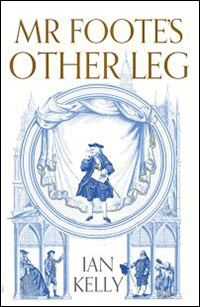
*
The Best Places to See the Best Theatre in London
When American visitors ask what they should see in London, I deflect. All right, when they insist, I lie. Strangers, civilians, have no idea how hard it is to recommend theatre to those one doesn't know. My new test, when asked, is to enquire what three shows my tormentors most recently enjoyed. No point, after all, in suggesting an obscure contemporary play by the newest 12-year-old wunderkind if what they most loved in the last five years was Mamma Mia! I've had several disasters encouraging new friends to savor the joys of Sondheim when they'd really prefer Strindberg.
So there are pitfalls in being a theatre critic, not least that we see so much that our vision is necessarily skewed by the huge burden of baggage we take into the theatre with us, all the productions we've seen before this one. A Shakespeare virgin of my acquaintance recently almost danced out of the Globe, thrilled by a production which was so bland that, had she asked me in advance, I would have dissuaded her from seeing. When you've seen three Macbeths in six months, it's kind of hard to get excited about a fourth, no matter how promising the cast or director. Yet, if it's your first ever Thane of Cawdor, what riches! How I should love to see Macbeth or any of the great Shakespeare plays for the first time.
Recommending is full of pitfalls. But if it's someone I know, someone whose theatrical knowledge is sound and wide-ranging, then I always start by looking at what's on at the National Theatre. Under director Nick Hytner, the choice is always extensive and exciting. Of course there are a few duds in every season, you'd expect that, but overall, its three auditoria, all performing plays in rotating repertory, present a staggering array of first-class theatre from contemporary to classic, from comic to tragic, from experimental to traditional. The National Theatre is one of this country's less heralded national miracles. Without a fuss it goes on, from week to week and from year to year, consistently producing the best theatre to be found anywhere in the world. It's even possible to access the Travelex £12 tickets for every show in the Olivier Theatre, but it's not easy, as canny Londoners snap them up almost as soon as they go on sale. Then, if there's nothing at the National that I think might appeal, I look at the Almeida and the Donmar. Every actor wants to work at these two small, unassuming performance spaces because, simply, they provide the opportunities to work on the most interesting plays with the best directors. This is the final season for Michael Attenborough — son of Richard, nephew of David (yes, they are an overachieving family) — and he's overseen the building of his drafty Islington theatre into a powerhouse of theatrical strength and innovation. There is not a ticket to be had at the Almeida, and it's one of the places I go without knowing anything about the play except that it's at that theatre. Book in advance — a long way in advance.
 |
||
| The Donmar Warehouse |
The equally brilliant Michael Grandage, whose productions of Red and Hamlet with Jude Law went on to Broadway with great success, succeeded Mendes as artistic director. Grandage's replacement is the extraordinary Josie Rourke, whose first full season this is. She started with a bang with The Recruiting Officer and hasn't put a foot wrong yet. Her first productions have included an all female production of Shakespeare's most testosterone-fueled history, Julius Caesar and Racine's Bérénice.
The main problem at the Donmar, if you're a visitor without much chance to book in advance, is that it's a small place with very few seats, all of which tend to be sold out all the time. Don't despair, a new deal was recently announced, almost too good to be true, which allows you to pick up a ticket to the Donmar's productions for a mere £10. True, you have to get yourself (or a helpful friend) to the box office by 10 AM on Monday morning but, if you do, the box office is selling 300 front-row stalls and circle, the best seats in the admittedly small house, for three weeks hence, at just £10. Given the quality of the plays and the actors performing them, this is worth your time on any Monday. It is just about possible to do this online at donmarwarehouse.com/barclaysfrontrow, but better in person.
 |
||
| "Mr. Foote's Other Leg" |
It's nearly time again for the annual Sheridan Morley Prize for Theatre Biography and I've been on a reading binge of the best of this year's crop of which there are surprisingly many. I haven't read them all yet but two of the best so far are Ian Kelly's "Mr. Foote's Other Leg," about Samuel Foote, largely forgotten now but in his time one of the most famous men in Georgian London, a larger than life one-legged comedy superstar, celebrity impressionist, impresario, playwright and crime writer. I walked around with this book all through the Christmas break, unable to put it down, unwilling to finish it. Ian Kelly has written what is undoubtedly one of the most entertaining books of the year, his lightness of touch disguising the depth and quality of his historical research.
Quite different but equally fascinating is Kate Bassett's biography of the brilliant but troubled Jonathan Miller. Aptly titled "In Two Minds," Miller has ever been unable to make up his mind whether he is a doctor or a theatre and opera director and he has always done both, at each juncture feeling himself in the wrong pigeonhole. One of the original Beyond the Fringe team, Miller went into showbusiness by the accident of Beyond the Fringe's Broadway success but Bassett show how this constant shifting of focus between medicine and opera has informed a life lived at the top of the intellectual community.
*
Ivy and Joan By James Hogan, and Julian Slade's Musical Salad Days There's a tiny new theatre in town, well, hardly a theatre at all, really, but The Balcony at The Print Room in an unlikely part of London, Notting Hill (yes, that Notting Hill), has just opened with two plays by James Hogan. Hogan is better known as a publisher of theatre books than as a playwright but these two short plays, Ivy and Joan, are heart-breakingly poignant sketches of disappointment and make me anxious to see more of the playwright.
 |
||
| Lynne Miller |
||
| photo by Nobby Clark |
*
Sadness is the last emotion you could associate with the adorable production of Julian Slade's classic '50s musical Salad Days, in glorious revival at Riverside Studios. An enchanting romp through young love with the aid of a magic piano, it is performed by a little opera company, Téte â Téte, who enter into the spirit of innocence and simplicity of the original. The difference between this and other recent revivals is the quality of the singing which is superb.
As the big-screen version of Les Misérables hits these shores and wins Oscars and Golden Globes and Baftas, it's worth mentioning that, without Salad Days, there would be no Les Miz. At the age of eight, as a birthday treat, a little Scottish boy was taken to see the show. So delighted was he with a magic piano that appeared to play itself that he ran down the aisle of the theatre to see how it worked. As luck would have it, the composer Julian Slade was playing the piano in the pit that afternoon and offered to demonstrate the piano for the child and then took him on a backstage tour.
That little boy grew up to be Sir Cameron Mackintosh, perhaps the most successful producer of musicals in the history of the theatre and the man who believed in, and gave birth to, Cats, The Phantom of the Opera, Miss Saigon and Mary Poppins. Oh, and Les Misérables.
(Ruth Leon is a London and New York City arts writer and critic whose work has been seen in Playbill magazine and other publications.)
Check out Playbill.com's London listings. Seek out more of Playbill.com's international coverage, including London correspondent Mark Shenton's daily news reporting from the U.K.










